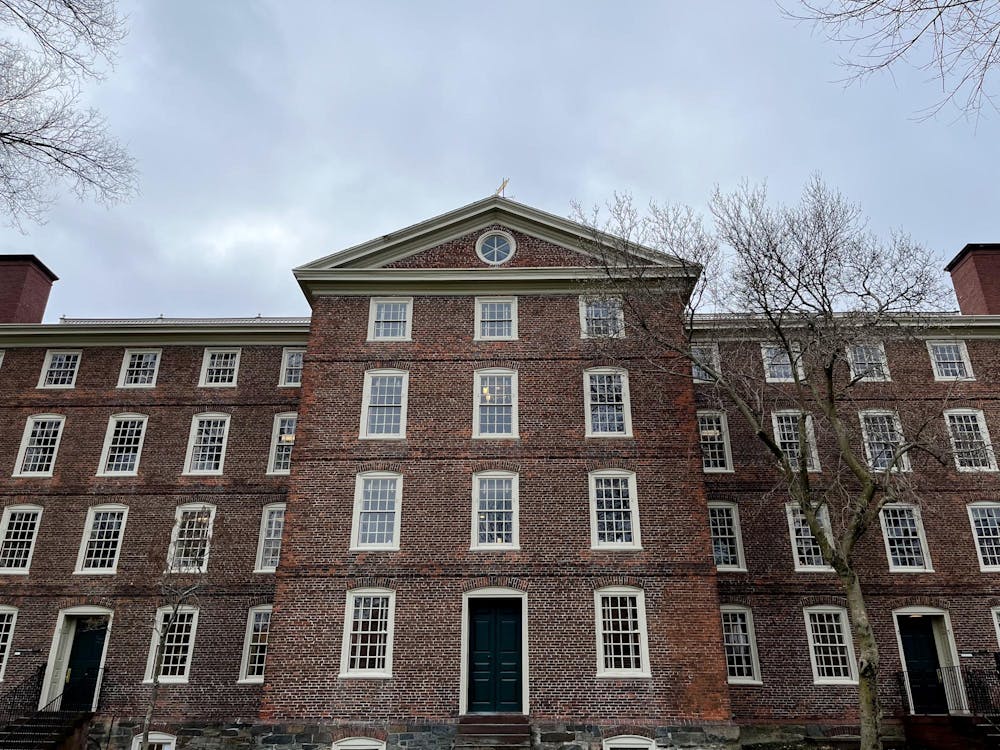At Tuesday’s faculty meeting, President Paxson P’19 P’MD’20 reaffirmed the University’s plans to pursue charges against the 41 Brown students who were arrested in a Dec. 11 sit-in. The students demanded Paxson to call for a ceasefire in the ongoing Israel-Palestine war and support divestment from “Israeli military occupation.”
During the meeting, Paxson touched on topics related to the current campus climate, Brown’s unique position relative to other universities and the ongoing Title VI Shared Ancestry Investigation by the Office for Civil Rights in the U.S. Department of Education.
Yannis Hamilakis, a professor of archeology and modern Greek studies, asked Paxson if she had reconsidered the University’s position to pursue charges against the 41 students. Hamilakis noted a letter signed by 118 faculty and staff members calling on the University administration to drop the charges.
“It’s actually important that our students understand that there are consequences for their decisions,” Paxson responded. “The students were told very, very clearly what would happen if they didn’t leave the building.”
“If we don't do this, then we really are saying we have no tools to make sure that students understand their responsibilities and the consequences,” she said.
The students were arraigned in court on Feb. 12 and Feb. 14 where all 41 pleaded not guilty to “willful trespassing within school buildings,” The Herald previously reported.
In November, University Investment Office officials claimed that Brown does not “directly invest in any weapons manufacturers” or companies with direct ties to Israel, also noting that a large portion of the endowment is invested in external managers with confidential portfolios.
Paxson expressed optimism about Brown’s campus climate compared to those of peer institutions throughout the meeting. “We’re not getting a lot of the outside interference that I think some universities are getting,” she said. Paxson added that some other universities are under congressional investigation and others “have large donors who are trying to exert influence over (universities’) academic programs.”
On Dec. 7, Congress opened up investigations into the Massachusetts Institute of Technology, Harvard and Penn following a hearing on antisemitism that prompted national backlash. Harvard President Claudine Gay and Penn President Liz Magill resigned in the following weeks.
Paxson shared that the Corporation — the University’s highest governing body — had a “long discussion about academic freedom” and shared governance during their last meeting. The February meeting of the Corporation coincided with protests during the one-week mark of a hunger strike that called for the Corporation to discuss a proposal for divestment from “companies which profit from human rights abuses in Palestine.”
In addition, Paxson also commented on the ongoing OCR investigation into Brown that follows a complaint by Zachary Marschall, editor-in-chief of conservative campus news site Campus Reform, which alleged the University discriminated against its Jewish students. Marschall has no affiliation with the University.
“I think that the most likely outcome will be when the Office of Civil Rights gets around to looking at Brown, they’ll look and they’ll say ‘You’re doing a good job,’” Paxson said. “I don’t think we have to worry about severe consequences.”
She noted that she is a “little bit worried” about the time it may take to resolve, given the number of cases the OCR is currently investigating. The OCR website currently lists 122 open Title VI shared ancestry investigations.
“I’m worried about it from a reputational view,” Paxson said. “I want people to think and know that we’re doing a really good job.”
“Complaints that are filed with the Office of Civil Rights and the U.S. Department of Education are typically resolved one way or the other — sometimes without findings (and) sometimes early,” General Counsel Eileen Goldgeier said at the meeting. “We think we have a great defense.”
“We’re proceeding and providing and cooperating with the Office of Civil Rights and their investigation,” she added.

Ryan Doherty is the managing editor of digital content and vice president of The Herald's 135th editorial board. He is a junior from Carmel, NY who is concentrating in chemistry and economics. He previously served as a university news and science & research editor, covering faculty and higher education.

Cate Latimer is a university news editor covering faculty, University Hall and higher education. She is from Portland, OR, and studies English and Urban Studies. In her free time, you can find her playing ultimate frisbee or rewatching episodes of Parks and Rec.





